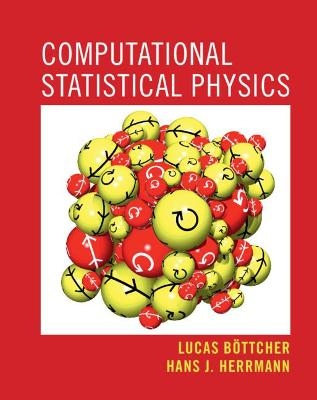
Computational Statistical Physics
Cambridge University Press (Verlag)
978-1-108-84142-9 (ISBN)
Providing a detailed and pedagogical account of the rapidly-growing field of computational statistical physics, this book covers both the theoretical foundations of equilibrium and non-equilibrium statistical physics, and also modern, computational applications such as percolation, random walks, magnetic systems, machine learning dynamics, and spreading processes on complex networks. A detailed discussion of molecular dynamics simulations is also included, a topic of great importance in biophysics and physical chemistry. The accessible and self-contained approach adopted by the authors makes this book suitable for teaching courses at graduate level, and numerous worked examples and end of chapter problems allow students to test their progress and understanding.
Lucas Böttcher is Assistant Professor of Computational Social Science at Frankfurt School of Finance and Management and Research Scientist at UCLA's Department of Computational Medicine. His research areas include statistical physics, applied mathematics, complex systems science, and computational physics. He is interested in the application of concepts and models from statistical physics to other disciplines, including biology, ecology, and sociology. Hans J. Herrmann is Directeur de Recherche at CNRS in Paris, visiting Professor at the Federal University of Ceará in Brazil and Emeritus of ETH Zürich. He is a Guggenheim Fellow (1986), member of the Brazilian Academy of Science, and a Fellow of the American Physical Society. He has been the recipient of numerous prestigious awards including the Max-Planck Prize (2002), the Gentner-Kastler prize (2005), the Aneesur Rahman prize (2018), and an IBM Faculty Award (2009), and he has received an ERC Advanced Grant (2012). He is Managing Editor of International Journal of Modern Physics C and of Granular Matter. He has coauthored over 700 publications and coedited 13 books.
Preface; Part I. Stochastic Methods: 1. Random Numbers; 2. Random-Geometrical Models; 3. Equilibrium Systems; 4. Monte-Carlo Methods; 5. Phase Transitions; 6. Cluster Algorithms; 7. Histogram Methods; 8. Renormalization Group; 9. Learning and Optimizing; 10. Parallelization; 11. Non-Equilibrium Systems; Part II. Molecular Dynamics: 12. Basic Molecular Dynamics; 13. Optimizing Molecular Dynamics; 14. Dynamics of Composed Particles; 15. Long-Range Potentials; 16. Canonical Ensemble; 17. Inelastic Collisions in Molecular Dynamics; 18. Event-Driven Molecular Dynamics; 19. Non-Spherical Particles; 20. Contact Dynamics; 21. Discrete Fluid Models; 22. Ab-Initio Simulations; References; Index.
| Erscheinungsdatum | 27.08.2021 |
|---|---|
| Zusatzinfo | Worked examples or Exercises |
| Verlagsort | Cambridge |
| Sprache | englisch |
| Maße | 208 x 260 mm |
| Gewicht | 750 g |
| Themenwelt | Mathematik / Informatik ► Mathematik ► Angewandte Mathematik |
| Mathematik / Informatik ► Mathematik ► Computerprogramme / Computeralgebra | |
| Naturwissenschaften ► Physik / Astronomie ► Thermodynamik | |
| ISBN-10 | 1-108-84142-2 / 1108841422 |
| ISBN-13 | 978-1-108-84142-9 / 9781108841429 |
| Zustand | Neuware |
| Haben Sie eine Frage zum Produkt? |
aus dem Bereich


